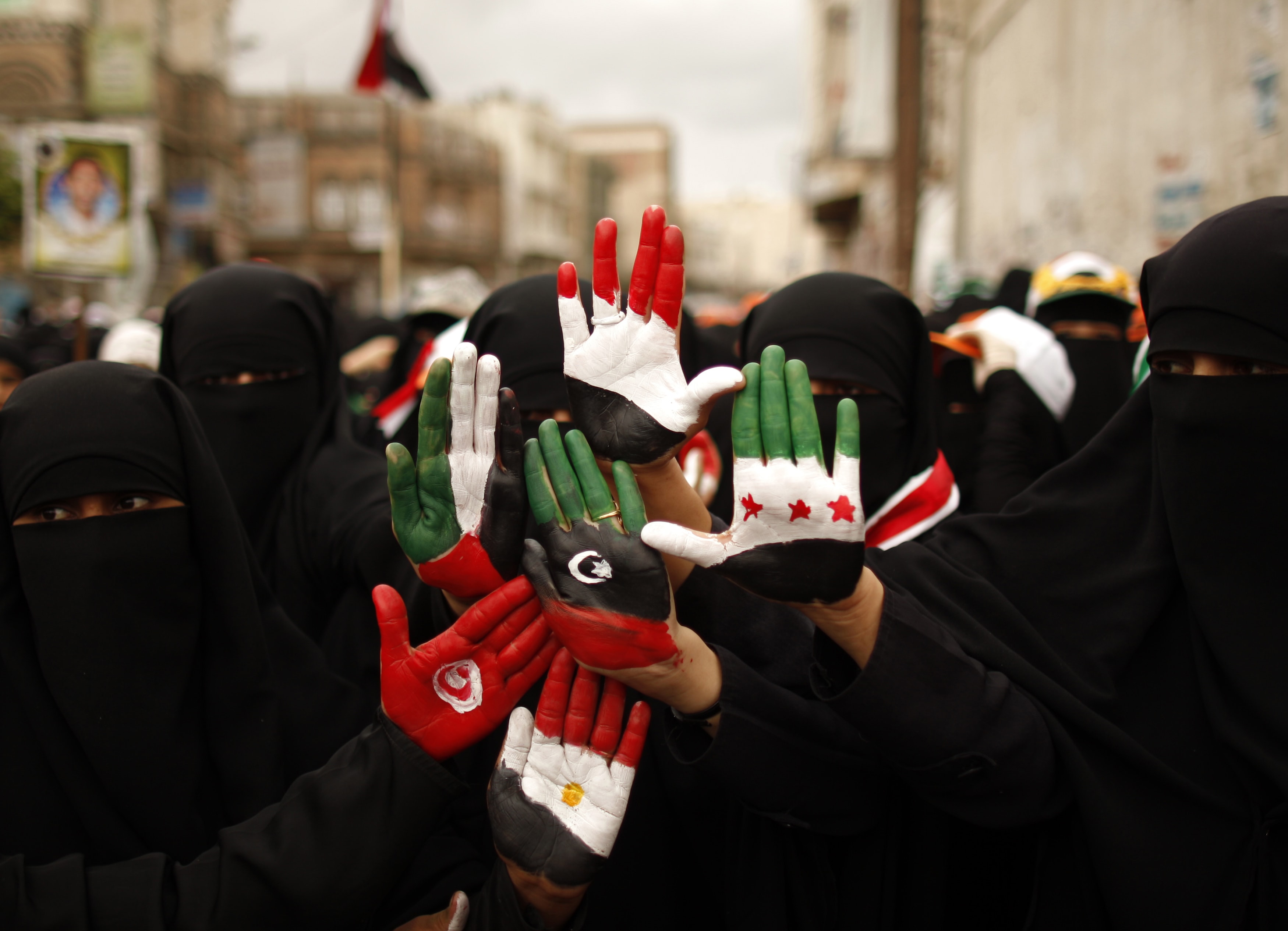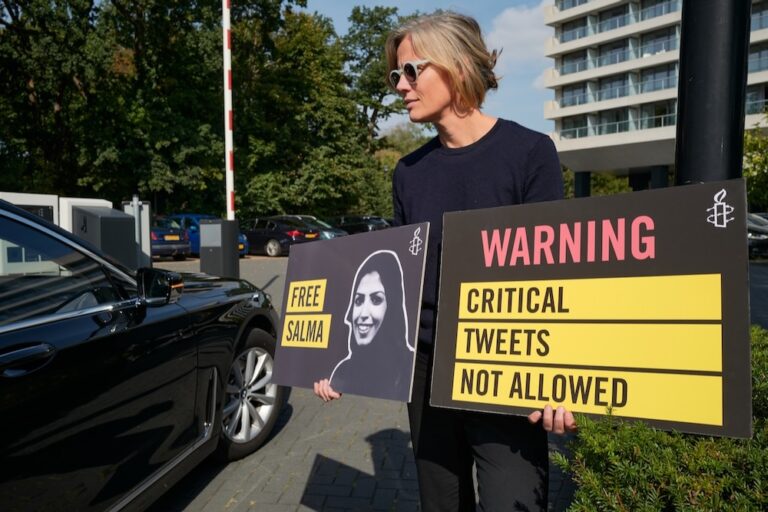Two years after the "Arab Spring" swept the region and led to the ouster of rulers in Egypt, Tunisia, Libya, and Yemen, the state of human rights in these countries remains dire and the transition to democracy faces major challenges.
Two years after the “Arab Spring” swept the Arab region and led within months to the ouster of the autocratic rulers in Egypt, Tunisia, Libya, and Yemen, the state of human rights in these countries remains dire and the transition to democracy faces major challenges. Arab countries which were less affected by the “Arab Spring” also continue to witness serious human rights violations which vary from one country to the next. Meanwhile, brutal crimes continue to be committed by the Syrian regime, the opposition too has been responsible for severe violations. These are some of the rights-related issues dealt with in the fifth annual report published by the Cairo Institute for Human Rights Studies under the title of “Delivering Democracy: Repercussions of the ‘Arab Spring’ on Human Rights”.
The report evaluates the state of human rights in the states which witnessed popular uprisings starting in 2010/2011, including Bahrain, Tunisia, Egypt, Libya, Yemen, and Syria. It further dedicates a separate section to analyzing a number of Arab states which were lesser affected by the uprisings of the “Arab Spring.”
The first section of the report focuses on the thematic issues related to the “Arab Spring,” including the impacts on the dynamics of the League of Arab States, the challenges facing the creation and implementation of transitional justice mechanisms, and the repercussions of the rise of Islamists to power in several Arab countries on the state of human rights in these countries. This section begins with an analytical summary of the most prominent patterns of violations to human rights seen in the Arab region in 2012. The introduction of the report also seeks to ascertain the prospects for the “Arab Spring” in light of the vast gap between the hopes of the Arab revolutionaries and the performance of the new authorities in these countries.
The report affirms that Egyptians are paying a heavy price for their revolution as the chances for building national consensus around the transitional period dissipate. The practices of the Muslim Brotherhood have exacerbated political divisions after their candidate was elected president, particularly through the group’s insistence on passing a constitution which did not enjoy the approval of many sectors of Egyptian society and which paves the way for the establishment of political and religious authoritarianism, threatens women’s rights, undermines hard-won press freedoms, authorizes military trials of civilians for the first time in Egypt’s history, bestows constitutional legitimacy on child labor, and grants vast powers to the president.
The report notes that the repressive practices of the new regime – established by the Muslim Brotherhood – not only make use of the tools employed by the former regime, such as the police apparatus or legal prosecutions through the public prosecutor – but also employs its members and supporters to commit violence against protestors, including by detaining and torturing those who criticize the president or the Muslim Brotherhood. This has led to the escalation of violence used in response as well, as has been seen in the street battles which have broken out and the attempts to burn dozens of offices pertaining to the Muslim Brotherhood and its affiliated political party.
The report notes that in Tunisia, the hopes for democratic transition have been met with frustrations, such as the fact that the Islamist Ennahda party has thwarted legislation which would strengthen and protect press freedoms and the organization of the field of audiovisual communications. The Ennahda party has also allowed for the freedom of expression to become increasingly threatened by Salafist groups, as has become clear through provisions of the a recent draft of the constitution, which lays the groundwork for further restrictions to be imposed on the press. At least one draft of the constitution has also included provisions which would undermine complete equality between men and women and minimize the role of international treaties in the framework of Tunisian law.
The report further notes the failure in both Egypt and Tunisia to reform the security establishments, to put an end to impunity, to stop grave violations committed by the police, particularly in the contexts of peaceful assemblies and protests, and to cease practices of torture and other ill-treatment of prisoners.
In Libya, the interim authorities continue to be incapable of bringing the country under their unified control, particularly as a result of the continued presence of armed militias in the country and the escalation of religious extremism. Despite the significant opening which has been seen in terms of the space available for free expression as well as the increasingly prominent role of civil society in the country, this progress comes at the same time as acts of revenge – including extrajudicial killings, arbitrary arrest, abductions, and torture – continue to be carried out against those who are suspected of having been loyal to the Qaddafi regime.
In Yemen, the interim authorities continued to face major challenges in reestablishing security in light of the divisions within the army and the fact that the family of the president continues to control the security apparatus, the central security forces and the republican guard. The centers of political power which continue to struggle to fill the power vacuum created following the departure of the former president remain in control of detention centers which are not administered by the government nor are they subjected to judicial oversight. Arbitrary arrest, enforced disappearance, and torture have spread, and peaceful gatherings continue to be targeted, even as the press is repressed, particularly in the south of the country. Increasing terrorist activities exacerbate this state of affairs and have even begun to affect the Yemeni capital.
In Syria, the brutal repression of the popular uprising and of the armed resistance has led to the deaths of at least 36,000 civilians, and at least 32,000 people have been arbitrarily detained since the beginning of the uprising. Torture has also led to the deaths of hundreds. A large number of detainees – among them rights activists, journalists, and members of the political opposition – became disappeared. Nearly a million people were forced to flee their homes as well. In addition to these violations, the report draws attention to the political and sectarian forces at play in Lebanon, particularly in light of the repercussions of the conflict in Syria, and the escalating sectarian clashes which have occurred and which have led to the deaths of dozens of Lebanese as well.
The report further examines the situation in Iraq, where violence and terrorist acts continue to be committed and have led to the deaths of some 4400 people, due to the chronic failure of the authorities to administer the political process, to reform the security sector, and to put an end to the security crisis in the country. The report further points out that religious, ideological, and ethnic minorities continue to be targeted and discriminated against, including through armed attacks which aim to entrench the control of the majorities – i.e. the Arab Shiites and Sunnis and the Kurds – on political power and wealth in Iraq.
The report further clarifies how the Bashir regime in Sudan continues to snub efforts to apply international justice, which demands the surrender of a number of high-ranking Sudanese officials to the International Criminal Court. Instead, the Sudanese regime continues to commit grave crimes and to violate international humanitarian law, leading to the deaths of hundreds of residents from Darfur, Kordofan, and Blue Nile. The government has further imposed a form of siege on these areas which is greatly exacerbating the humanitarian needs and threatens to starve those living in Kordofan and Blue Nile. This has led to the displacement of tens of thousands of Sudanese.
The report asserts that the continued immunity from accountability enjoyed by Israel for the crimes committed in the occupied Palestinian territories allows it to continue to commit further violations, including through expanding its illegal settlements, continuing its besiege into the Gaza Strip for a sixth year, and continuing to commit brutal attacks on the Gaza Strip, which led in just one week in November to the deaths of 156 people, including 103 civilians, a third of whom were children.
The report notes that the excessive use of force to repress political protests has led to dozens of deaths in Egypt, Yemen, Sudan, Bahrain, and Saudi Arabia. The Moroccan authorities have allowed a relative amount of space for political protests, yet they respond with violent security measures against certain social movements and against protests conducted by those living in the Western Sahara, including through arrest campaigns and the use of courts which do not provide due process guarantees.
Human rights defenders and the organizations with which they work have also been subjected to serious attacks in the Arab region, particularly in Bahrain, Saudi Arabia, Egypt, and Algeria, where the repressive legal frameworks are employed to prevent organizations from becoming legally registered or to criminalize rights activities and refer those involved in them to trial. While Algeria passed new legislation to govern the work of NGOs which is even more repressive than the previous law, the new regime in Egypt is also planning to pass a law which would subject civil society organizations to complete government oversight and stifle human rights organizations in particular. Human rights defenders in Syria are exposed to all sorts of violations ranging from extrajudicial killings to arrest and enforced disappearance. The Moroccan authorities continue to arbitrarily harass those involved in the defense of human rights in the Western Sahara particularly, and the Lebanese authorities have turned recently to referring rights activists to military courts.
The report notes that the continuation of impunity for grave violations committed by the police in all these countries goes hand in hand with the continuation of widespread practices of torture, which have led to the deaths of a number of victims, notably in Syria, Egypt, Libya, Bahrain, Yemen, and Iraq as well as in the occupied Palestinian territories (both in detention facilities under the control of the National Palestinian Authority in the West Bank and in those run by Hamas in the Gaza Strip).



